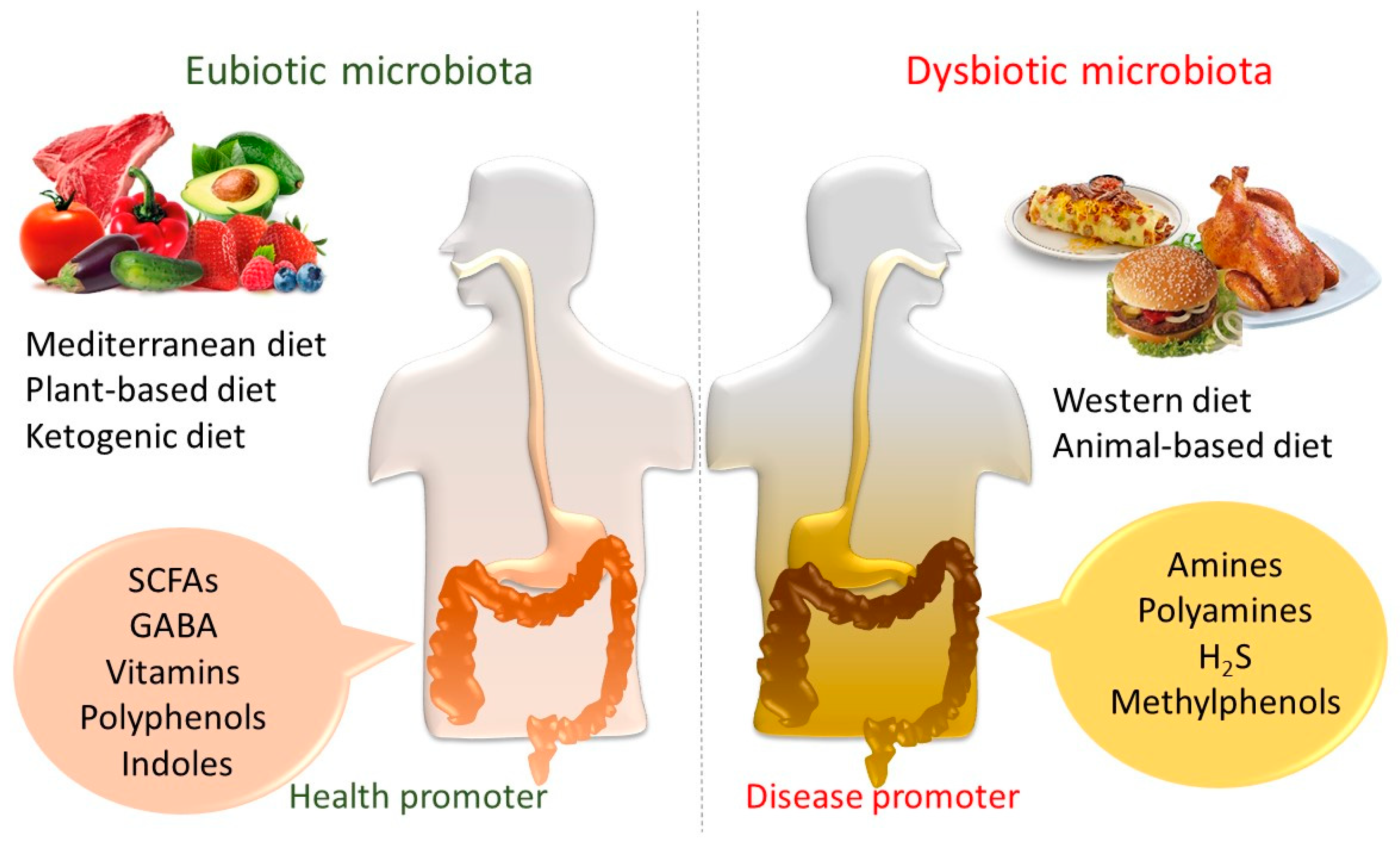The Gut-Brain Connection and Weight Management
Weight loss and digestive health: the colon’s role – The intricate relationship between your gut and brain, often referred to as the gut-brain axis, plays a significant role in weight management. This bidirectional communication system involves complex signaling pathways influencing appetite, satiety, and overall energy balance. Understanding this connection is crucial for developing effective weight management strategies.
Bidirectional Communication Pathways Between Gut Microbiome and Brain
The gut microbiome, a vast community of microorganisms residing in your digestive tract, communicates with the brain through various pathways. Neurotransmitters produced by gut bacteria, such as serotonin and GABA, directly influence brain function, affecting mood, appetite, and stress levels. Furthermore, the vagus nerve, a major communication channel between the gut and brain, transmits signals related to gut activity and nutrient status, influencing appetite regulation and satiety.
Role of Gut Hormones in Weight Management
Gut hormones, such as ghrelin (the “hunger hormone”) and leptin (the “satiety hormone”), are key players in weight management. Ghrelin stimulates appetite, while leptin signals fullness. A healthy colon contributes to balanced hormone production. Dysbiosis, an imbalance in gut microbiota, can disrupt the production and signaling of these hormones, leading to altered appetite regulation and potential weight gain.
Comparative Analysis of Gut Microbiota Composition
Studies comparing gut microbiota composition in individuals with healthy weight versus those with obesity reveal significant differences. Individuals with obesity often exhibit a reduced abundance of beneficial bacteria and an increased proportion of certain bacteria associated with inflammation and increased energy extraction from food. A healthy colon, characterized by diverse and balanced microbiota, supports optimal hormone production and efficient nutrient processing, contributing to healthy weight management.
Colon Health and Nutrient Absorption
The colon plays a vital role in nutrient absorption, particularly water, electrolytes, and short-chain fatty acids (SCFAs). These processes significantly impact energy metabolism, appetite regulation, and overall weight management.
Mechanisms of Nutrient Absorption in the Colon
The colon efficiently absorbs water and electrolytes, preventing dehydration and maintaining fluid balance. It also ferments undigested carbohydrates, producing SCFAs like butyrate, propionate, and acetate. These SCFAs are crucial for colonocyte health and have systemic effects on energy metabolism and appetite regulation.
Impact of SCFAs on Energy Metabolism and Appetite
SCFAs have various metabolic effects. Butyrate serves as the primary energy source for colonocytes, while propionate and acetate influence glucose metabolism and appetite regulation in the liver and brain. They also modulate the gut microbiota composition, promoting a healthy balance.
Dietary Factors Affecting Colon Nutrient Absorption
Dietary fiber is essential for optimal nutrient absorption in the colon. Fiber acts as a prebiotic, feeding beneficial bacteria and promoting SCFA production. A diet rich in fruits, vegetables, and whole grains ensures adequate fiber intake, supporting healthy colon function and weight management. Conversely, diets lacking in fiber can lead to constipation and reduced SCFA production.
Impact of Different Fiber Types on Colon Health and Weight Loss

Different fiber types have varying effects on colon health and weight management.
| Fiber Type | Impact on Colon Health | Impact on Weight Loss | Examples |
|---|---|---|---|
| Soluble | Promotes healthy gut bacteria, slows digestion, improves blood sugar control | May aid in weight loss by increasing satiety and slowing digestion | Oats, beans, apples |
| Insoluble | Adds bulk to stool, prevents constipation, promotes regular bowel movements | May indirectly support weight loss by improving gut motility and preventing constipation | Wheat bran, vegetables |
The Colon’s Role in Waste Elimination and Detoxification: Weight Loss And Digestive Health: The Colon’s Role
The colon’s primary function is waste elimination. Regular bowel movements are crucial for overall health and can indirectly influence weight management. The colon also plays a role in detoxification, though this is less direct than the liver’s role.
Process of Waste Elimination in the Colon
Waste products from digestion enter the colon, where water is absorbed, solidifying the waste into stool. Peristalsis, the rhythmic contractions of the colon muscles, moves the stool toward the rectum for elimination. Regular bowel movements are essential for efficient waste removal and preventing the buildup of toxins.
Constipation and Weight Gain, Weight loss and digestive health: the colon’s role
Constipation, characterized by infrequent or difficult bowel movements, can contribute to weight gain. The buildup of waste products in the colon can lead to bloating and discomfort, sometimes misinterpreted as hunger, leading to increased food intake. Furthermore, constipation can interfere with nutrient absorption, potentially affecting metabolism.
Colon’s Role in Detoxification
While the liver is the primary detoxification organ, the colon also plays a supporting role. It eliminates certain toxins and metabolic byproducts through bowel movements. Impaired colon function can hinder this process, potentially leading to the accumulation of toxins and impacting overall health and potentially weight.
Stages of Waste Elimination in the Colon

The process can be visualized in stages: 1. Ingestion and Digestion; 2. Movement through the small intestine; 3. Arrival in the large intestine (colon); 4. Water absorption; 5. Stool formation; 6. Elimination through rectum.
Inflammatory Bowel Disease (IBD) and Weight Changes
Inflammatory bowel disease (IBD), encompassing Crohn’s disease and ulcerative colitis, can significantly impact weight. Both weight gain and weight loss are possible, depending on the disease’s severity, location, and individual response to treatment.
Link Between IBD and Weight Changes
IBD can cause weight loss due to malabsorption of nutrients, increased inflammation, and frequent diarrhea. Conversely, certain medications used to treat IBD can contribute to weight gain. The chronic inflammation associated with IBD also increases energy expenditure, contributing to weight loss in some individuals.
Mechanisms of IBD’s Impact on Nutrient Absorption and Energy Expenditure
Inflammation in the digestive tract damages the intestinal lining, impairing nutrient absorption. Diarrhea further reduces nutrient absorption, leading to deficiencies. The body’s increased energy expenditure in response to chronic inflammation can also lead to weight loss.
Nutritional Needs and Dietary Recommendations for IBD
Nutritional management is crucial for individuals with IBD. Dietary recommendations often involve avoiding trigger foods, managing inflammation, and ensuring adequate nutrient intake. Individualized approaches are essential based on disease severity and individual tolerance.
- Focus on nutrient-dense foods to compensate for malabsorption.
- Consider low-FODMAP diet to reduce symptoms.
- Supplement with vitamins and minerals as needed.
- Work with a registered dietitian to create a personalized plan.
The Impact of Probiotics and Prebiotics on Colon Health and Weight
Probiotics and prebiotics are increasingly recognized for their potential benefits in improving colon health and influencing weight management. These substances act by modulating the gut microbiota, promoting a healthy balance of beneficial bacteria.
Mechanisms of Probiotics and Prebiotics
Probiotics are live microorganisms that, when administered in adequate amounts, confer a health benefit on the host. Prebiotics are non-digestible food ingredients that selectively stimulate the growth and/or activity of beneficial bacteria in the gut. Both contribute to a more diverse and balanced gut microbiota, promoting better digestion and reducing inflammation.
Potential Benefits of Probiotics and Prebiotics for Weight Management
Research suggests that probiotics and prebiotics may influence weight management by modulating appetite hormones, improving metabolism, and reducing inflammation. They may also enhance nutrient absorption and increase satiety.
Research Findings on Probiotics and Prebiotics in Weight Loss
Several studies have shown positive effects of specific probiotic and prebiotic strains on weight loss and body composition, although more research is needed to establish clear causal relationships and determine optimal dosages and strains.
Probiotic and Prebiotic-Rich Foods
Many foods naturally contain probiotics or prebiotics. Incorporating these foods into your diet can support a healthy gut microbiome and potentially aid in weight management.
- Probiotics: Yogurt, kefir, sauerkraut, kimchi
- Prebiotics: Bananas, onions, garlic, asparagus, whole grains
Lifestyle Factors Affecting Colon Health and Weight Loss
Lifestyle factors such as stress, sleep, physical activity, and hydration significantly impact gut microbiota composition and weight management. Adopting a healthy lifestyle can support optimal colon function and promote weight loss.
Impact of Stress, Sleep, and Physical Activity
Chronic stress disrupts the gut microbiome, potentially leading to inflammation and weight gain. Sufficient sleep is crucial for gut health and metabolic regulation. Regular physical activity promotes healthy digestion and overall metabolic health.
Role of Hydration in Maintaining Optimal Colon Function
Adequate hydration is essential for proper bowel movements and prevents constipation. Water helps soften stool, making elimination easier and preventing the buildup of waste products in the colon.
Dietary Patterns Affecting Colon Health and Weight

Different dietary patterns affect colon health and weight differently. The low-FODMAP diet can be helpful for managing irritable bowel syndrome (IBS) symptoms, while the Mediterranean diet, rich in fruits, vegetables, and whole grains, supports overall gut health and weight management.
Lifestyle Modifications to Improve Colon Health and Promote Weight Loss
A comprehensive approach combining dietary changes, stress management, sufficient sleep, regular physical activity, and adequate hydration is most effective in improving colon health and promoting weight loss.
- Diet: Increase fiber intake, choose whole grains, limit processed foods and sugar.
- Stress Management: Practice relaxation techniques like yoga or meditation.
- Sleep: Aim for 7-9 hours of quality sleep per night.
- Physical Activity: Engage in at least 30 minutes of moderate-intensity exercise most days of the week.
- Hydration: Drink plenty of water throughout the day.


